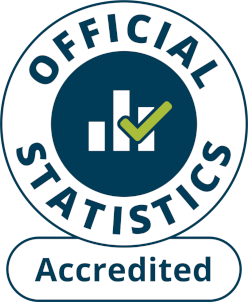DCMS and Digital Economic Estimates: Business Demographics, 2023
National Statistics providing an estimate of the contribution of DCMS and digital sectors to the UK economy, measured by business numbers and characteristics.
Documents
Details
Revision note:
15 November 2024: We have made a small number of revisions to the DCMS Economic Estimates Business Demographics 2023 report and data tables, following the identification of an error. This affects figures for Tourism Industries in 2023 in Tables 2 to 6; 2023 Audio Visual figures in Tables 2, 4, 5 and 6 and the 2022 DCMS total in Table 2.
About
These economic estimates are National Statistics providing an estimate of the contribution of DCMS Sectors to the UK economy, measured by the number of businesses.
Headline findings
DCMS
In March 2023 there were 584,920 businesses in the included DCMS sectors, a decrease of 3,245 (0.6%) from March 2022. This is compared to a decrease of 1.5% in UK registered businesses overall.
In March 2023 the vast majority (87.3%) of businesses in included DCMS sectors fell into the micro (0 to 9) employment band, a slightly lower proportion than for UK registered businesses in general (89.1%).
In March 2023, 79.5% of included DCMS sector businesses had a turnover of less than £250,000, a higher proportion than for UK businesses in general (68.1%).
Digital sector
There were 200,600 businesses in the digital sector, a decrease of 9,090 (4.3%) from March 2022. This is compared to a decrease of 1.5% in UK registered businesses overall.
The vast majority (91.9%) of businesses in the digital sector fell into the micro (0 to 9) employment band, a slightly higher proportion than for UK registered businesses in general (89.1%).
In March 2023, 78.3% of digital sector businesses had a turnover of less than £250,000, a higher proportion than for UK businesses in general (68.1%).
Content
These statistics cover the contributions of the following DCMS sectors to the UK economy;
- creative industries
- cultural sector
- gambling
- sport
- tourism (defined in this release as the tourism industries)
Users should note that there is overlap between DCMS sector definitions. Estimates are not available for the civil society sector, because they are not identifiable in the data source used for this release.
These statistics also cover the contributions of the digital sector and telecoms to the UK economy. Users should note telecoms sits wholly within the digital sector.
The release also includes estimates for the audio visual sector, which is not a DCMS sector or digital sector but is “adjacent” to them and includes some industries also common to DCMS and digital sectors.
A definition for each sector is available in the published data tables.
Recent changes to this release
We have made a number of changes to DCMS and digital sector economic estimates: business demographics in recent years:
- previous reports have included data on charities registered with the Charity Commission of England and Wales, Community Interest Companies (CICs) and the now-discontinued Public Service Mutuals which were defined as civil society organisations
- previous releases have included estimates of the turnover produced by businesses in each employment band and the number of businesses by foreign-owned status, both of which are not available in this release due to the change in data source from the Annual Business Survey (ABS) to the Inter-Departmental Business Register (IDBR)
Additional information about the change in data source from the ABS to the IDBR in 2022 can be found in the source data change summary note.
We welcome any views on these changes at evidence@dcms.gov.uk.
Released
These statistics were first published on 16 November 2023.
The UK Statistics Authority
DCMS economic estimates are accredited official statistics and published in accordance with the standards of trustworthiness, quality and value in the Code of Practice for Statistics, produced by the UK Statistics Authority (UKSA). Accredited official statistics are called National Statistics in the Statistics and Registration Service Act 2007. These official statistics were independently reviewed by the Office for Statistics Regulation in June 2019.
The UKSA has the overall objective of promoting and safeguarding the production and publication of official statistics that serve the public good. It monitors and reports on all official statistics, and promotes good practice in this area.
Our statistical practice is regulated by the Office for Statistics Regulation (OSR). OSR sets the standards of trustworthiness, quality and value in the Code of Practice for Statistics that all producers of official statistics should adhere to. You are welcome to contact us directly with any comments about how we meet these standards. Alternatively, you can contact OSR by emailing regulation@statistics.gov.uk or via the OSR website.
Pre-release access
The accompanying pre-release access document lists ministers and officials who have received privileged early access to this release. In line with best practice, the list has been kept to a minimum and those given access for briefing purposes had a maximum of 24 hours.
Contact
Responsible analyst: Eri Hutchinson
For any queries or feedback, please contact evidence@dcms.gov.uk
Hard copy feedback can be sent to:
DCMS Economic Estimates Team
Department for Culture, Media & Sport
4th Floor - area 4/34
100 Parliament Street
London
SW1A 2BQ
Updates to this page
-
15 November 2024: We have made a small number of revisions to the DCMS Economic Estimates Business Demographics 2023 report and data tables, following the identification of an error. This affects figures for Tourism Industries in 2023 in Tables 2 to 6; 2023 Audio Visual figures in Tables 2, 4, 5 and 6 and the 2022 DCMS total in Table 2.
-
First published.
